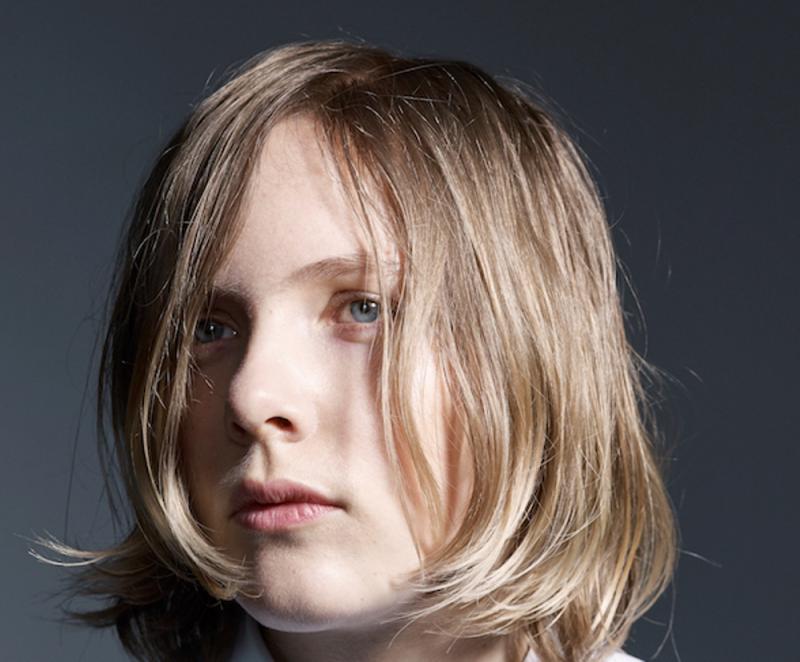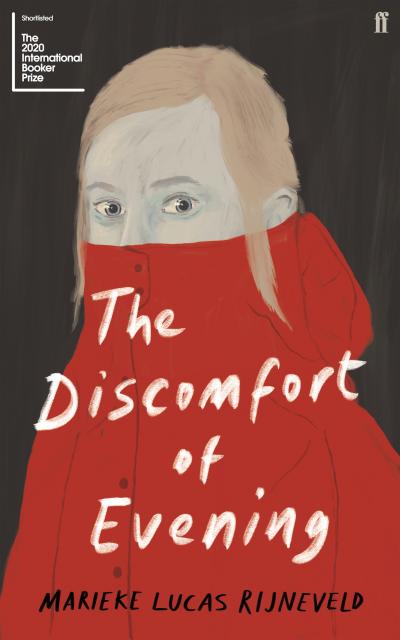Marieke Lucas Rijneveld: The Discomfort of Evening review - lovelessness, loneliness, bodies and their limits | reviews, news & interviews
Marieke Lucas Rijneveld: The Discomfort of Evening review - lovelessness, loneliness, bodies and their limits
Marieke Lucas Rijneveld: The Discomfort of Evening review - lovelessness, loneliness, bodies and their limits
Dark and highly original debut novel grapples with grief and growing up on a Dutch farm

“I was ten and stopped taking off my coat.” This bare beginning marks the opening of Marieke Lucas Rijneveld’s startling and lyrical novel, translated from the Dutch by Michele Hutchison: an introduction to ten-year-old Jas and the dislocated world of metaphor she inhabits. Later, she kidnaps two toads and hides them in a bucket in her bedroom, deeming them talismanic substitutes for her parents: if the toads mate, so will they, and everything will be alright.
It’s on the day of her oldest brother’s death, two days before Christmas in an ice-skating accident, that she stops removing her coat. She’ll become dangerously ill without it, she believes, and applies the teachings of a strict Reformist upbringing to explain the form her suppressed feelings have taken: “I think I’m just like Samson, though my strength isn’t in my hair but in my coat. Without my coat I’ll be Death’s slave, do you get that?”

She and her siblings have been trying to “meet death” in their different ways – Obbe, her older brother, by ceremoniously drowning his hamster. Jas, by withdrawing into herself, becoming severely constipated and experimenting with suffocation, hoping “to fish Matthies out of his sleep”. Together with Hanna, the youngest, she plays a morbid question game. How are their parents more likely to die: “Car accident or burning?" “Murdered or cancer?”
Answers are few on the family’s dairy farm, and the imposing silence intensifies when the cows fall victim to foot-and-mouth disease. Increasingly the violence inside them all "makes noise". The children are not alone in this. Jas’s mother throws herself off a stepladder in the kitchen in protest at Jas’ refusal to take off her coat. Her father, treating his daughter as he would a calf, shoves chunks of green soap deep into her rectum, a supposed cure for constipation.
Jas contemplates escape: leaving home and daring to remove her protective red layer: “Even though it will feel uncomfortable for a while, but according to the pastor, discomfort is good. In discomfort we are real.” It’s the only time the book references the title directly, but Rijneveld’s portrait of Jas and her grief-stricken family continuously tests those boundaries of distress. A confrontation with lovelessness, loneliness, bodies and their limits, it’s a devastatingly vivid, minutely observed exploration of growing up in the aftermath of loss and under the pressure of increasing emotional neglect.
In the midst of this unremitting bleakness, Jas’s naivety filters the growing suffering. Her imagination probes at the reasons why things are the way they are: “Mum and Dad never cuddle; that must be because some of your secrets end up sticking to the other person, like Vaseline. That’s why I spontaneously never give hugs myself – I’m not sure which secrets I want to give away.” Nimble in her noticings, she makes neat jumps between contexts, as Rijneveld creates an idiom that’s childishly wise. The game of eye contact: “other people’s eyeballs are two lovely marbles you can continuously win or lose". Her parents’ searching hands: “if you were no longer able to hold an animal or a person tenderly, it was better to let go and turn your attention to other useful things instead.” Sometimes she seems almost too knowing for her age, her observations steady with aphoristic confidence: “some people lose God when they find themselves; some people lose God when they lose themselves.” But she doesn’t always draw the right conclusions.
“‘Death is a process that disintegrates into actions and actions into phases. Death never just happens to you, there is always something that causes it.”’ The warped chronology of that assertion, its deceptively simple non-sequiturs and hunt for a root, get at the experience of the book’s weird, haunting vertigo. Something end-stopped becomes ongoing, then flakes apart and finds itself itemised.
As an urgent portrayal of what it means to feel undone and shut in by grief, The Discomfort of Evening is an intoxicating, dark and highly original debut. It was a bestseller in Rijneveld's native Netherlands, and the English translation has recently been shortlisted for the International Booker prize. It's easy to see why.
- The Discomfort of Evening by Marieke Lucas Rijneveld translated by Michele Hutchison (Faber & Faber, £12.99)
- Read more book reviews on theartsdesk
The future of Arts Journalism
You can stop theartsdesk.com closing!
We urgently need financing to survive. Our fundraising drive has thus far raised £49,000 but we need to reach £100,000 or we will be forced to close. Please contribute here: https://gofund.me/c3f6033d
And if you can forward this information to anyone who might assist, we’d be grateful.

Subscribe to theartsdesk.com
Thank you for continuing to read our work on theartsdesk.com. For unlimited access to every article in its entirety, including our archive of more than 15,000 pieces, we're asking for £5 per month or £40 per year. We feel it's a very good deal, and hope you do too.
To take a subscription now simply click here.
And if you're looking for that extra gift for a friend or family member, why not treat them to a theartsdesk.com gift subscription?
more Books
 'We are bowled over!' Thank you for your messages of love and support
Much-appreciated words of commendation from readers and the cultural community
'We are bowled over!' Thank you for your messages of love and support
Much-appreciated words of commendation from readers and the cultural community
 Thomas Pynchon - Shadow Ticket review - pulp diction
Thomas Pynchon's latest (and possibly last) book is fun - for a while
Thomas Pynchon - Shadow Ticket review - pulp diction
Thomas Pynchon's latest (and possibly last) book is fun - for a while
 Justin Lewis: Into the Groove review - fun and fact-filled trip through Eighties pop
Month by month journey through a decade gives insights into ordinary people’s lives
Justin Lewis: Into the Groove review - fun and fact-filled trip through Eighties pop
Month by month journey through a decade gives insights into ordinary people’s lives
 Joanna Pocock: Greyhound review - on the road again
A writer retraces her steps to furrow a deeper path through modern America
Joanna Pocock: Greyhound review - on the road again
A writer retraces her steps to furrow a deeper path through modern America
 Mark Hussey: Mrs Dalloway - Biography of a Novel review - echoes across crises
On the centenary of the work's publication an insightful book shows its prescience
Mark Hussey: Mrs Dalloway - Biography of a Novel review - echoes across crises
On the centenary of the work's publication an insightful book shows its prescience
 Frances Wilson: Electric Spark - The Enigma of Muriel Spark review - the matter of fact
Frances Wilson employs her full artistic power to keep pace with Spark’s fantastic and fugitive life
Frances Wilson: Electric Spark - The Enigma of Muriel Spark review - the matter of fact
Frances Wilson employs her full artistic power to keep pace with Spark’s fantastic and fugitive life
 Elizabeth Alker: Everything We Do is Music review - Prokofiev goes pop
A compelling journey into a surprising musical kinship
Elizabeth Alker: Everything We Do is Music review - Prokofiev goes pop
A compelling journey into a surprising musical kinship
 Natalia Ginzburg: The City and the House review - a dying art
Dick Davis renders this analogue love-letter in polyphonic English
Natalia Ginzburg: The City and the House review - a dying art
Dick Davis renders this analogue love-letter in polyphonic English
 Tom Raworth: Cancer review - truthfulness
A 'lost' book reconfirms Raworth’s legacy as one of the great lyric poets
Tom Raworth: Cancer review - truthfulness
A 'lost' book reconfirms Raworth’s legacy as one of the great lyric poets
 Ian Leslie: John and Paul - A Love Story in Songs review - help!
Ian Leslie loses himself in amateur psychology, and fatally misreads The Beatles
Ian Leslie: John and Paul - A Love Story in Songs review - help!
Ian Leslie loses himself in amateur psychology, and fatally misreads The Beatles
 Samuel Arbesman: The Magic of Code review - the spark ages
A wide-eyed take on our digital world can’t quite dispel the dangers
Samuel Arbesman: The Magic of Code review - the spark ages
A wide-eyed take on our digital world can’t quite dispel the dangers
 Zsuzsanna Gahse: Mountainish review - seeking refuge
Notes on danger and dialogue in the shadow of the Swiss Alps
Zsuzsanna Gahse: Mountainish review - seeking refuge
Notes on danger and dialogue in the shadow of the Swiss Alps

Add comment